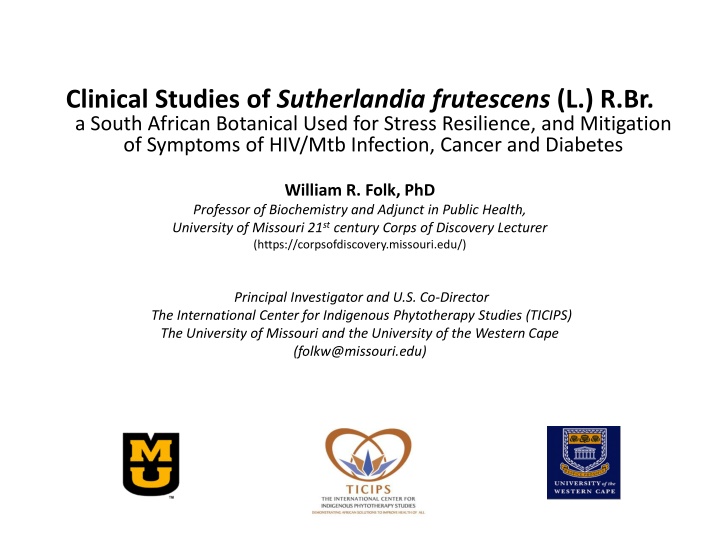Clinical Studies of Sutherlandia frutescens: Botanical for Stress Resilience & Health Conditions
Sutherlandia frutescens, a South African botanical, is utilized for stress resilience and addressing symptoms of HIV, cancer, and diabetes. Research findings suggest potential interactions with medications like isoniazid, warranting further evaluation for safety and efficacy.
Download Presentation

Please find below an Image/Link to download the presentation.
The content on the website is provided AS IS for your information and personal use only. It may not be sold, licensed, or shared on other websites without obtaining consent from the author.If you encounter any issues during the download, it is possible that the publisher has removed the file from their server.
You are allowed to download the files provided on this website for personal or commercial use, subject to the condition that they are used lawfully. All files are the property of their respective owners.
The content on the website is provided AS IS for your information and personal use only. It may not be sold, licensed, or shared on other websites without obtaining consent from the author.
E N D
Presentation Transcript
Clinical Studies of Sutherlandia frutescens (L.) R.Br. a South African Botanical Used for Stress Resilience, and Mitigation of Symptoms of HIV/Mtb Infection, Cancer and Diabetes William R. Folk, PhD Professor of Biochemistry and Adjunct in Public Health, University of Missouri 21stcentury Corps of Discovery Lecturer (https://corpsofdiscovery.missouri.edu/) Principal Investigator and U.S. Co-Director The International Center for Indigenous Phytotherapy Studies (TICIPS) The University of Missouri and the University of the Western Cape (folkw@missouri.edu)
Uses of Sutherlandia and TICIPS Research Sutherlandia frutescens ( Sutherlandia / Unwele / Cancer Bush ) is extensively used in southern Africa by traditional medical practitioners (usually in combination with other plant products), and by the public seeking natural cures. Sutherlandia is claimed to be an adaptogen , to modulate the immune system and to help individuals manage stress and symptoms of HIV infection. Claims also are made for treating diabetes and cancers etc. Sutherlandia is available throughout the world by internet sales (http://www.Sutherlandia.org), and is undoubtedly used in combination with allopathic/conventional medicines, but with no assurance of safety. Sutherlandia toxicology studied in primates, found no evidence of harm at high doses. TICIPS RCT in healthy adult humans found no significant adverse events (PLoS Clin Trials. 2007, doi: 0.1371/journal.pctr.0020016) TICIPS RCT in HIV+ adults found no effect on HIV progression, but determined potential interference with mTB prophylaxis (PLoS One. 2015. doi: 10.1371/journal.pone.0128522). TICIPS studies in cell culture and animals indicates potential interaction with isoniazid used for Mtb prophylaxis (Neuromolecular Med. 2016. doi: 10.1007/s12017-016-8402-1).
2015 doi: 10.1371/journal.pone.0128522. Background A two-stage randomized double-blind placebo controlled study was used to evaluate the safety of consuming dried S. frutescens by HIV seropositive adults with CD4 T-lymphocyte count of >350 cells/ L. All subjects used isoniazid preventive therapy (IPT) to control co-infection by Mycobacterium tuberculosis, which is prevalent. Methods In Stage 1 56 participants were randomized to S. frutescens 400, 800 or 1,200 mg twice daily or matching placebo for 24 weeks. In Stage 2 77 additional participants were randomized to either 1,200 mg S. frutescens or placebo. In the final analysis data from Stage 1 and Stage 2 were combined such that 107 participants were analysed (54 in the S. frutescens 1,200 mg arm and 53 in the placebo arm). Results S. frutescens did not change HIV viral load, and CD4 T-lymphocyte count was similar in the two arms at 24 weeks; however, mean and total burden of infection (BOI; defined as days of infection-related events in each participant) was greater in the S. frutescens arm: mean (SD) 5.0 (5.5) vs. 9.0 (12.7) days (p = 0.045), attributed to two active tuberculosis infections in subjects taking isoniazid preventive therapy (IPT). Conclusion A possible interaction between S. frutescens and IPT needs further evaluation, and may presage antagonistic interactions with other herbs having similar biochemical (antioxidant) properties.
Use of botanicals containing antioxidants may compromise the activation of isoniazid, promoting Mtb drug resistance. Such interference is also likely to occur with conventional treatments of cancer, diabetes, etc. (Neuromolecular Med. 2016. doi: 10.1007/s12017-016-8402-1). Anti-oxidants in botanicals























